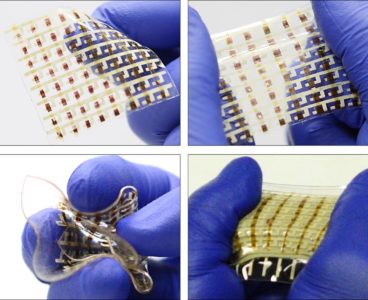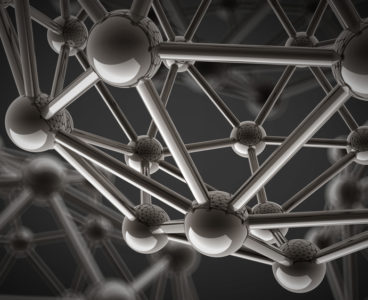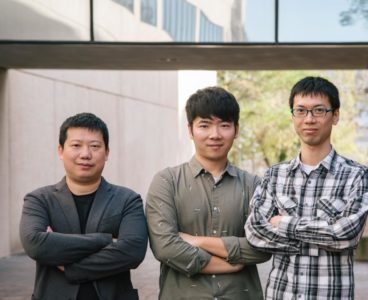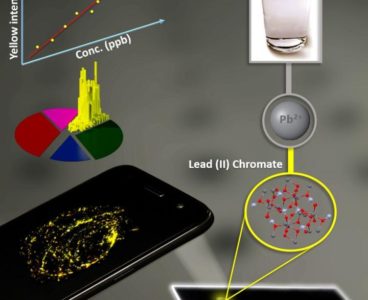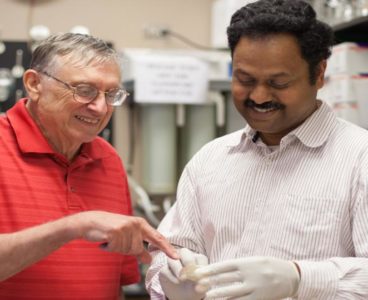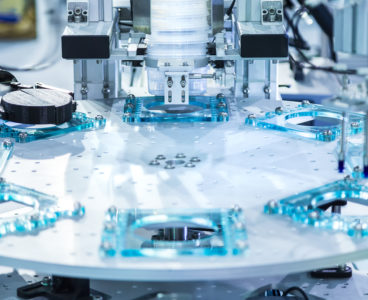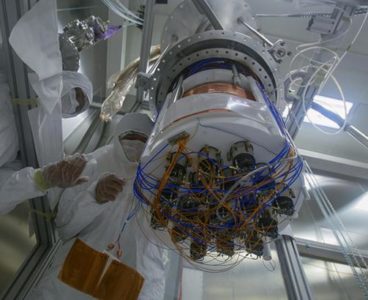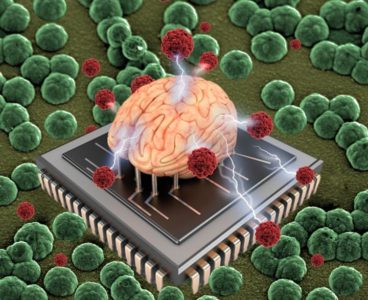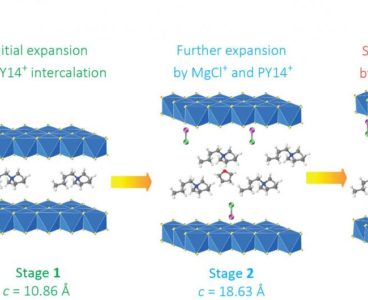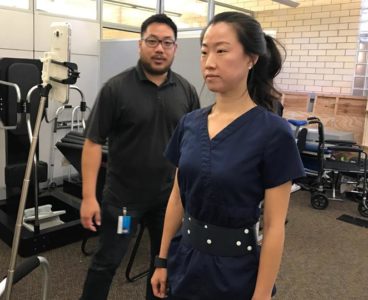Researchers from the University of Houston have reported significant advances in stretchable electronics, moving the field closer to commercialization. In a paper published Friday, Feb. 1, in Science Advances, they outlined advances in creating stretchable rubbery semiconductors, including rubbery integrated electronics, logic circuits and arrayed sensory skins fully based on rubber materials. Cunjiang Yu, Bill…
New Method Yields Higher Transition Temperature in Superconducting Materials
Researchers from the University of Houston have reported a new way to raise the transition temperature of superconducting materials, boosting the temperature at which the superconductors are able to operate. The results, reported in the Proceedings of the National Academy of Sciences, suggest a previously unexplored avenue for achieving higher-temperature superconductivity, which offers a number…
UH Researchers Report New Class of Polyethylene Catalyst
A team of chemists from the University of Houston has reported the discovery of a new class of catalyst to produce ultra-high-weight polyethylene, a potential new source of high-strength, abrasion-resistant plastic used for products ranging from bulletproof vests to artificial joints. The nickel-based catalyst is described in a paper published Friday, Jan. 25, in Nature…
New Thermoelectric Material Delivers Record Performance
Lean Electrolyte Design is a Game-Changer for Magnesium Batteries
Researchers from the University of Houston and the Toyota Research Institute of America have discovered a promising new version of high-energy magnesium batteries, with potential applications ranging from electric vehicles to battery storage for renewable energy systems. The battery, reported Dec. 21 in Joule, is the first reported to operate with limited electrolytes while using…
New Algorithm can More Quickly Predict LED Materials
Researchers from the University of Houston have devised a new machine learning algorithm that is efficient enough to run on a personal computer and predict the properties of more than 100,000 compounds in search of those most likely to be efficient phosphors for LED lighting. They then synthesized and tested one of the compounds predicted…
Artificial Intelligence Helps Reveal How People Process Abstract Thought
Novel Smartphone System Tests for Lead in Water
The discovery of lead in Flint, Michigan’s drinking water drew renewed attention to the health risks posed by the metal. Now researchers at the University of Houston have created an inexpensive system using a smartphone and a lens made with an inkjet printer that can detect lead in tap water at levels commonly accepted as…
Why Bacteria Survive in Space—Biologists Discover Clues
In professor George Fox’s lab at the University of Houston, scientists are studying Earth germs that could be contaminating other planets. Despite extreme decontamination efforts, bacterial spores from Earth still manage to find their way into outer space aboard spacecraft. Fox and his team are examining how and why some spores elude decontamination. Their research…
Researchers Design ‘Soft’ Robots That Can Move on Their Own
Scientists Investigate Mysterious Dark Matter
University of Houston scientists are helping to develop a technology that could hold the key to unraveling one of the great mysteries of science: what constitutes dark matter? Scientists believe dark matter makes up 85 percent of the matter in the universe, but nobody actually knows what dark matter is. “If we are the experiment…
Could A Saliva Test Be Next for Lupus?
The symptoms of systemic lupus erythematosus (known as SLE or lupus) can fool you. You might think you’re tired or have a cold when, in fact, you may actually have this autoimmune disease that leads to chronic inflammation in multiple organs. Blood tests or a kidney biopsy can confirm the diagnosis and extent of organ…
Researchers Report Breakthrough in Magnesium Batteries
Magnesium batteries offer promise for safely powering modern life – unlike traditional lithium ion batteries, they are not flammable or subject to exploding – but their ability to store energy has been limited. Researchers reported Aug. 24 in the journal Nature Communicationsthe discovery of a new design for the battery cathode, drastically increasing the storage capacity…
Scientists Reveal Better Way to Create Organic Bioelectronics
With increasing scientific and medical interest in communication with the nervous system, demand is growing for biomedical devices that can better record and stimulate the nervous system, as well as deliver drugs and biomolecules in precise dosages. Researchers with the University of Houston and Pennsylvania State University have reported a new fabrication technique for biocompatible…
Scientists Reveal Better Way to Create Organic Bioelectronics
With increasing scientific and medical interest in communication with the nervous system, demand is growing for biomedical devices that can better record and stimulate the nervous system, as well as deliver drugs and biomolecules in precise dosages. Researchers with the University of Houston and Pennsylvania State University have reported a new fabrication technique for biocompatible…
Researchers Report Breakthrough in Magnesium Batteries
Magnesium batteries offer promise for safely powering modern life — unlike traditional lithium ion batteries, they are not flammable or subject to exploding — but their ability to store energy has been limited. Researchers reported Aug. 24 in the journal Nature Communications the discovery of a new design for the battery cathode, drastically increasing the storage capacity…
UH Researcher Working to Make Security Cameras ‘Smarter’
Security cameras deployed across the nation – at transit stops, sporting events and other places where people gather – can provide valuable clues to law enforcement investigating trouble after the fact. A University of Houston researcher is developing a system that would allow the cameras to recognize and send an alert at the first sign…
Biofeedback Technology Helping Improve Balance in Parkinson’s Patients
University of Houston researchers in the Department of Health and Human Performance are helping patients with Parkinson’s disease regain stable balance and confidence in performing daily activities in their own homes. A research team is developing the Smarter Balance System (SBS), a smartphone-based biofeedback rehabilitation system that guides patients through a series of balance exercises…
Inexpensive Organic Material Gives Safe Batteries a Longer Life
Modern batteries power everything from cars to cell phones, but they are far from perfect – they catch fire, they perform poorly in cold weather and they have relatively short lifecycles, among other issues. Now researchers from the University of Houston have described a new class of material that addresses many of those concerns in Nature…
MRI-Powered Mini-Robots Could Offer Targeted Treatment
Invasive surgical techniques – cutting through the breastbone for open heart surgery or making a large incision to inspect an abdominal tumor – allow physicians to effectively treat disease but can lead to sometimes serious complications and dramatically slow healing for the patient. Scientists instead want to deploy dozens, or even thousands of tiny robots…
Researchers Report New Understanding Of Global Warming
Researchers know that more, and more dangerous, storms have begun to occur as the climate warms. A team of scientists has reported an underlying explanation, using meteorological satellite data gathered over a 35-year period. The examination of the movement and interaction of mechanical energies across the atmosphere, published Jan. 24 in the journal Nature Communications, is…
Researchers Discover New Material to Improve De-Icing
Icy conditions can be deadly, whether you’re flying into bad weather or too close to power transmission lines during a storm. Researchers at the University of Houston have reported the discovery of a material that can be applied to any surface to repel ice. The material, known as a magnetic slippery surface (MAGSS) is described…
Researchers Report Advance in Low-Cost Clean Energy Generation
Researchers Propose New Treatment to Prevent Kidney Stones
Researchers are Pioneering Tools for Heart Regeneration
Cardiovascular diseases are the leading cause of death in the U.S. With one in every four deaths occurring each year, the five-year survival rate after a heart attack is worse than most cancers. A big part of the problem is the inability of the human heart to effectively repair itself after injury. A team of…

